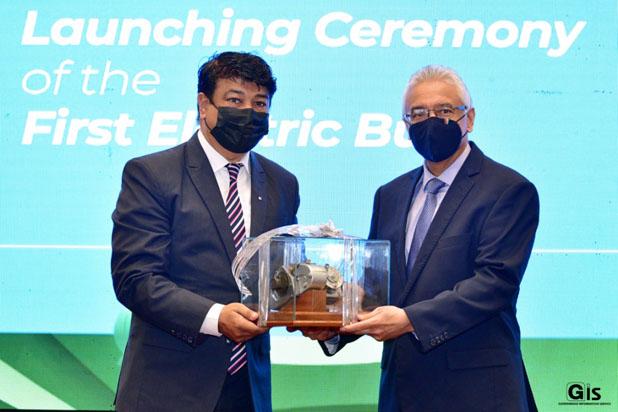Africa-Press – Mauritius. The first electric bus of the National Transport Corporation (NTC), was launched, this afternoon, by the Prime Minister, Mr Pravind Kumar Jugnauth, at Sir Harilall Vaghjee Memorial Hall, in Port-Louis.
The Minister of Land Transport and Light Rail, Minister of Foreign Affairs, Regional Integration and International Trade, Mr Alan Ganoo, the Minister of Environment, Solid Waste Management and Climate Change, Mr Kavydass Ramano, the High Commissioner of India to Mauritius, Mrs K.
Nandini Singla, the General Manager (GM) of the NTC, Mr Rao Ramah, as well as other eminent personalities were present on the occasion. In his address, the Prime Minister highlighted that today marks a milestone in the history of the NTC through the launching of its first electric bus that will contribute to pave the way for a modern, safe and environmental-friendly transport system in our country.
Prime Minister Jugnauth recalled that the NTC is the largest bus company in Mauritius, with an operational fleet of 513 buses and operating on 97 routes with a manpower of 2,200 employees.
The Corporation has an average daily ridership of 130,000 passengers, performing over 1 million trips yearly and covering an annual average distance of 27 million kms.
This electric bus, he underlined, is in line with the Government’s policy to encourage the use of renewable and clean energy so as to reduce the country’s dependence on fossil fuels and decrease greenhouse gas emissions by 40% by 2030, and to achieve 60% of green energy in our energy mix by 2030.
In addition, Prime Minister Jugnauth emphasised that the use of this electric bus will enable the NTC not only to be more ecological through less emission of Carbon Gases but also to boost and modernise its services.
This first electric bus, he underlined, will be used to test the operational capability and reliability of electric bus on the NTC route network, to acquire knowledge on operational and maintenance infrastructural requirements, battery charging needs and driving skill requirement before investing in more electric buses for the future.
On this score, Mr Jugnauth stressed on the need to train employees to adapt themselves to this new transport system so as to contribute to improve the quality of life of the commuters and help translate NTC’s vision of bringing forth a modern transport system into reality.
The Prime Minister spoke of the implementation of a 10-year Roadmap for the integration of electric vehicles of the public and private sectors in Mauritius by the Ministry of Energy and Public Utilities to contribute towards the country’s strategy to decarbonise its energy sector and build the new pole of green energy industry.
On this score, he lauded the initiative of the NTC, as part of its fleet renewal plan, to replace 234 buses, this year, as well as gearing towards a shift from conventional diesel-powered buses to electric vehicles.
For his part, Minister Ganoo highlighted that the NTC has taken the next step to further modernise the transport sector in Mauritius and thereby improve the service offered to passengers and is entering a new era of modernity.
On this score, he reiterated his Ministry’s unflinching support to ensure that the NTC continues to move in the right direction as it plays an important role in improving the mobility of people around the island, through the provision of profitable as well as social routes transport.
These social routes transport system has been put in place in the best interest of the passengers including students, elderly people and the public to travel to work, school, shopping and out of town without transportation difficulties.
Mr Ganoo stressed that his Ministry is committed to reducing and eliminating carbon emissions in the public transport sector, and to achieve this result, the operation of electric buses should become a reality.
He thus pointed out that it is very important that we encourage the use of electric vehicles as part of our strategy to address climate change and reduce fossil fuel use. He gave an overview of various initiatives being undertaken to improve the public transport services, as well as to help eliminate carbon emissions.
These include: a new 15-seat van service launched in areas where there are significant transportation challenges; the upgrading of NTC’s Electronic Ticketing Machine system as a step in the right direction to improve efficiency at the company; improvement of NTC’s mechanism for recording passenger complaints and ensuring better tracking; amendment of the Road Traffic (Control of Vehicle Emissions) (Amendment) Regulations 2022 to allow for the use of the Smoke Meter to measure the emission levels of diesel vehicles, especially those that emit large amounts of black smoke.
As for the GM of NTC, he indicated that the launch of this electric bus, a 20-seater purchased from Leal Energie Ltd, might be a small step for the NTC but is a giant step for the public sector transport.
This project, he underlined, will be considered as an essential step in the competency building needs of the NTC in view of the future deployment of electric buses in its fleet.
Mr Ramah reiterated the need to make it the NTC a sustainable transport company through the transition from diesel to electric buses as they are less polluting, less costly, and more comfortable, thus, a key component of sustainable energy.
Moreover, the GM lauded the Government for taking concrete actions to actually mitigate the effects of climate change, through the Metro Express Project which is already running on electricity and by thinking far in the future through ecological objectives for 2030.
He also stressed that as authorities, they have a big responsibility when it comes to converting vehicles from fossil fuel to green energy and added that Mauritius can be at the forefront of rendering the whole of public sector green, thus contributing immensely to the Government’s objective of 40% reduction in the country’s greenhouse gas emission by 2030.
For More News And Analysis About Mauritius Follow Africa-Press







